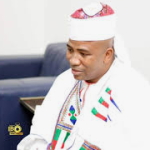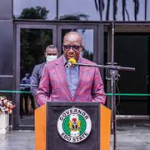The season comes with travelling, cooking of special delicacies, buying clothes for children, subscribing to infrastructure such as Christmas trees and other decorations, buying hampers and special gifts for loved ones, among others.
But this year, not many people are smiling. The galloping inflation in the country indicates that, for many people, this Christmas comes with mixed feelings…CLICK TO READ THE FULL NEWS HERE▶▶
Findings by DAILY POST revealed that in the transportation sector, fares are over increased by over 50% often discouraging many from travelling, except for more pressing reasons like wedding, burial ceremonies, family meetings, among others.
The removal of fuel subsidies by President Bola Ahmed Tinubu on May 29, 2023 and subsequent increase in the price of petrol led to an increase in transportation fares.
Consequently, some people have opted to send money to loved ones at home instead of travelling to villages for Christmas.
However, many Nigerians in the Federal Capital Territory and its environs defied the harsh socio-economic situation as they trooped into motor parks in large numbers to reunite with families and friends, especially those who can afford exorbitant transport fares.
Expectedly, drivers are using the opportunity to increase their fares to different parts of the country, particularly southern states.
Findings by DAILY POST revealed that commercial 18-seater buses have increased fares by over N10,000 to N15,000 per seat.
Trips to different states in the Southeast and South-south, which initially cost between N20,000 and N25,000, now cost between N30,000 and N35,000, respectively.
A trip from Abuja to Enugu State costs N35,000, Port Harcourt – N40,000, Lagos – N45,000, and Ilorin – N25,000.
Speaking to DAILY POST at some motor parks in Nyanya, a suburb of the FCT, as well as in Mararaba and Masaka, both outskirts of Abuja, domiciled in Nasarawa State, a driver of the commercial buses, Effiong Etim said the increased number of passengers ignited a hike in fares.
“We are adding money due to demand. This has nothing to do with the cost of fuel. You can see there are more passengers than vehicles.
“If you don’t buy a ticket at least 24 hours ahead, you will not get a seat,” he said.
Another driver, Abdulaziz Alowonle, who goes to Ilorin, Kwara State, said that though a journey from Abuja to Ilorin, N15,000, has been increased to N25,000, Nigerians are adapting to the situation.
He, however, expressed worries over the decline in the number of passengers this season.
“Going to Ilorin is not as exciting as it used to be. Charging N25,000 from the initial N15,000 is shocking to so many people.
“So, we see more family representatives travelling this year than the entire family. Can you imagine a family of six traveling?
“The cost implications are huge. You find mostly the men travelling, leaving their family behind in Abuja,” he said.
Another passenger travelling to Jos, Gyang Ibrahim, who described the N25,000 fare as painful, said he would have preferred travelling with his family but for the exorbitant fares, blaming the hike in transportation mainly on the seasonal demand.
“I am going because I have something fundamental to do in the village. I have to resolve a pressing family issue; otherwise, I would have stayed back in Abuja,” he lamented.
Another motorist, Ameh Sunday, traveling to Otukpo, Benue State, said the exorbitant costs are a source of discouragement to would-be travellers.
“Honestly, this is quite discouraging. Do they want us to spend every penny we have made on transport?
“There would be plenty of other expenses when one gets to the village and coming back after the celebration is another thing to contend with. This government is just making things unbearable for ordinary Nigerians,” he lamented.
Another driver, Godwin Peter, shuttling Abuja and Benue State, said the hike in transport fares is as a result of the high cost of fuel and a few people coming into the city during the Yuletide.
“There is always a pattern during the Christmas and New Year period. From my experience of over 20 years as a driver, many people travel to the village from the cities, while a few others move in the opposite direction.
“It is always a one-way thing. Therefore, there are usually a few available vehicles available to travellers; so we have to maximise the situation by increasing the transport fares from between 20 and 50 per cent.
“This is because drivers taking passengers to their villages often return without up to five passengers to Abuja.
“In order words, they return with empty vehicles. The few passengers they pick along the way pay little money for the driver to add to his fuel money.
“Again, it is not our fault that the demand for vehicles to travel is usually not met because so many people want to travel, whereas there are only a few buses available.
“Moreover, bus fares are usually more affordable compared to air fares,” he said.
Another motorist, Okafor Ekene, said the abnormally high transport fares is as a result of the removal of fuel subsidy and rising cost of vehicle spare parts, admitting that people are not travelling this year unlike the past years.
However, regardless of the price hike and public outcry, some Nigerians said travelling at Yuletide is an annual ritual that must be performed.
Mr Nkwegu Julius, who was travelling to Ebonyi State, told DAILY POST that his people are ready to defy high travel costs to unite with their families back home, stressing that the Yuletide season remains the most significant period to reunite with families and friends and cannot be sacrificed on the altar of high cost of transportation.
“We, the Igbos, don’t care about the cost of travelling during the Christmas season because it is a privilege for any Igbo man to travel to his father’s land.
“So, we don’t care how much it costs. I paid N40,000 now with my luggage, and I don’t mind; as long as I am going to my village in Ebonyi State, I don’t care,” he said.
Also, Mr Chuks Nnadi, travelling to Enugu State, shared a similar sentiment, saying it was necessary to travel because he has not seen his parents in a long time.
He, however, described the hike in fare as wickedness.
“Normally, they charged N12,000. Why hike it to over N30,000 when there was no recent increase in petrol pump price? It is wickedness, but we can do nothing,” he declared.
Aside from the transportation fare, it is not surprising that prices of food items have skyrocketed as many citizens are known to hike prices when it is celebration time, thereby making items unaffordable, especially for the average Nigerians at festive periods.
A market survey conducted by DAILY POST in the FCT showed that prices of almost all food items, especially those needed to celebrate the Yuletide, have increased.
For instance, prices of onions, yam, rice, beans, semolina, fish, tomatoes and other items have been hiked by traders, who cite high transportation costs, high demands and other factors as reasons.
These items have increased by more than 100 per cent over the last one year.
For example, a bag of rice, a staple during festive periods, now sells for an average of N107,000.
The price of a five-litre vegetable oil, which sold for N6,000 a year ago, now sells for N19,000.
Similarly, the cost of cooking gas has doubled over the past year in some regions, making it difficult for families to prepare traditional holiday meals conveniently
At Nyanya, Mararaba and Masaka markets, a sizable chicken was sold at between N15, 000 to N20, 000 as opposed to N10, 000 a few weeks ago.
A bag of 50kg local rice was sold at between N91,000, and above, as opposed to N75, 000 a few weeks ago.
Similarly, five tubers of sizable yam were sold at N20,000, while smaller ones were sold at N10,000, as opposed to N10,000 and N5,000, respectively.
On the other hand, a bunch of plantain was sold at N2,000, N3,000, N4,000, N5,000 and above, depending on the size.
Also, a small bucket of fresh tomatoes was sold at N5, 500, as opposed to N3, 500, while a small paint size of onions was sold at N10, 000.
Likewise, a mudu of yellow garri was sold at N1,000, while the white version was sold at N800.
A mudu of beans was sold at N3, 000, depending on the type.
Prices of spices and other ingredients needed for preparing different meals were also increased by either 80 per cent or 100 per cent, as opposed to what was obtainable a few weeks ago.
Mr. Ike Uguru, who sells Christmas trees and other decorations said, “The Christmas tree that we used to buy for N10,000 last year is now N15,000…CLICK TO READ THE FULL NEWS HERE▶▶
“The one that we sold for N20,000 last year, is now N30,000 or thereabouts. The difference is much.
“But sales have dropped because patronage has reduced. I have called many of my customers, and the majority of them said getting food to eat during Christmas is more important to them than buying Christmas trees,” he said.



